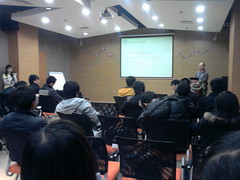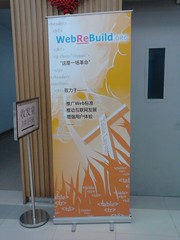Web Standards in Shanghai
Back in mid-January I retweeted a link from POPOEVER about a web standards meeting in Shanghai on Jan 30. Quietly, I registered, added the event to my Google Calendar, and when the time came I made the trip to Ctrip's Shanghai office to attend.
 It turns out that the event is connected to the 蓝色理想 BBS, a set of web design forums with a long (in internet time) and influential history on the Chinese internet. The event was an interesting format: first the host introduced a topic with three short bullet points which were discussed as a group, and then a speaker took the stage with a prepared talk on the topic based on their experience as coders or designers; this was repeated three times. I arrived a few minutes after the meeting started, but the topics I heard covered were workflow for daily and special projects (with a speaker from Taobao), using/developing Javascript libraries and frameworks (with a speaker from Ctrip), and the feasibility and future of HTML5 & CSS3. Discussion generally stayed on topic and drew from a wide range of experiences: large and small companies, professionals and hobbyists.
It turns out that the event is connected to the 蓝色理想 BBS, a set of web design forums with a long (in internet time) and influential history on the Chinese internet. The event was an interesting format: first the host introduced a topic with three short bullet points which were discussed as a group, and then a speaker took the stage with a prepared talk on the topic based on their experience as coders or designers; this was repeated three times. I arrived a few minutes after the meeting started, but the topics I heard covered were workflow for daily and special projects (with a speaker from Taobao), using/developing Javascript libraries and frameworks (with a speaker from Ctrip), and the feasibility and future of HTML5 & CSS3. Discussion generally stayed on topic and drew from a wide range of experiences: large and small companies, professionals and hobbyists.
 I didn't have much to contribute myself, having only been a hobbyist and out of the web development scene for quite some time. When I left, though, I felt like I should have said something like this:
I didn't have much to contribute myself, having only been a hobbyist and out of the web development scene for quite some time. When I left, though, I felt like I should have said something like this:
I began working with HTML and CSS in college. After graduating in 2001, I spent a year in Tianjin at a low-pressure job that left me a lot of time in the evenings, which I spent on experimenting with personal web projects. At some point I signed up for the css-discuss mailing list. Now, style sheets and semantic markup had long been a part of the early vision for the web, but were neglected by website and (certain) browser developers for many years. Css-discuss was a mailing list made up of independent web developers, students and hobbyists who were passionate about harnessing the ideas of style sheets and the semantic web to create a more powerful, more flexible World-Wide Web. And so css-discuss came to be a "voice in the wilderness" calling for a return to that original vision, and ran in the face of a by-then entrenched tradition of using tables for layout and FONT tags for styling. The individual members of css-discuss, working together, analyzed and documented the HTML and CSS rendering behaviors of different browsers, invented CSS hacks for targeting specific browsers, and pressured browser developers to code to web standards through an active blogosphere presence, professional involvements, and the founding of organizations like WaSP and publications like A List Apart. Over time, people and organizations came around to see the benefits of web standards. Now, the knowledge of web standards is widespread to the point of complacence, and no longer the cause of a small minority.
This isn't true in China though. Due to the late start of the web in China and the widespread piracy of software from Microsoft (a perennial offender on the web), web standards are still a cause worth promoting. Technically, I have nothing to add to the cause. Personally, what I can offer is support through my presence, and the experience that I described above, from which I derived a lesson that I summarize in this diagram:
No matter whether you're a small minority working against the tide of mainstream ideas or whether you're part of a movement of many people, progress in the cause will come from motivated individuals who commit to a praxis: the combination of thoughtful reflection and confident action.
To the W3CTech group, thank you for letting me sit in on your meeting and best wishes for you and the work ahead of you.



1 Comments:
Yeah, you should been introduced yourself, i think lots of people will be glad of your coming, especially you're a physics teacher not work on IT.
Post a Comment
« Home
Post a Comment